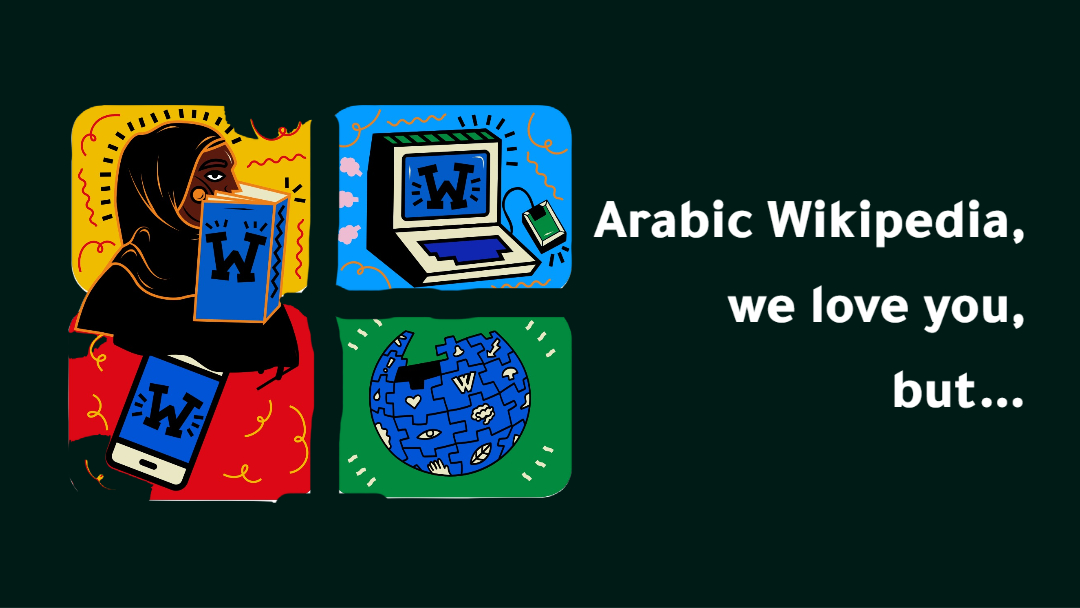At SMEX, one of the core pillars of our mission is free knowledge. This is why we have been a consistent supporter of Wikipedia, the free encyclopedia, along with its sibling projects, such as Wikidata. Wikipedia, which has 325 language editions, is the collaborative effort of countless contributors who aim to compile a reliable and free encyclopedia built with volunteer labor.
In its early days, Wikipedia’s software had no easy way to insert citations into articles. This earned it a negative reputation for unreliability, and educators instructed their students to avoid using it in their research. Since then, Wikipedia’s citation system has evolved, and its community-set rules for reliability have greatly evolved to include detailed citation guides. Thanks to this thorough editing process, Wikipedia became one of the most expansive compendiums of organized knowledge on the Internet, with over 6.4 million articles in English alone.
The Arabic-speaking world is well-represented in Wikipedia, with language Wikipedias available in Classical Arabic, Egyptian, and Maghrebi Darja, each of which has its unique community that sets its internal rules of governance independently. There are also Wikipedias in other languages spoken in the region, such as Sorani Kurdish, Kurmanji Kurdish, Aramaic, Kabyle, and Shilha.
Classical Arabic Wikipedia, which has been around since 2003 has over 1.1 million articles, and a community of approximately 5800 active editors and 26 administrators, who review and enforce the rules set by the community. Arabic Wikipedia has been a tremendously useful source of knowledge for Arabic speakers, providing helpful entries on a wide range of topics. Some of the most viewed articles on Arabic Wikipedia in 2021 were on technology and media companies, history, and sexual education.
So how does Arabic Wikipedia compare to Wikipedias in other languages? In terms of article count, it is the 16th largest Wikipedia. However, when we count the articles as compared to the number of the speakers of the language, Arabic Wikipedia shows a certain lack. There are about 3.66 articles per 1000 speakers. Less popular languages have a much higher count, for example Persian Wikipedia has 11.8 articles per 1000 speakers, and Russian has 10.7.
There are numerous reasons for this. Editing Wikipedia is not an easy task: it requires a lot of specialized knowledge, both on the subject of the article and on the internal operations of the community. The content must be written according to Arabic Wikipedia’s encyclopedic standards, and it must use appropriate references. The process is intimidating for beginners, and most editors do not continue editing after their first edit.
This problem becomes particularly evident when the subject of the article is politically sensitive. For example, the Arabic Wikipedia article on Rojava, the autonomous Kurdish region in Northern Syria, has been the site of many disputes about the terminology and phrasing of the politically sensitive subject. Articles involving homosexuality are also badly represented, with the category for lesbians using the derogatory term سحاقيات, and the article about the late LGBT socialist activist Sarah Hegazi getting deleted without proper justification. A now deleted tweet of a painting depicting the destruction of Sodom and Gomorrah, posted by the official Arabic Wikipedia Twitter account a day before the anniversary of Sarah Hegazi’s death, demonstrates this hostility.
This is not a problem that is unique to Arabic Wikipedia. It is a well-documented issue, and the Wikimedia Foundation as well as individual communities have made enormous efforts to make Wikipedia more welcoming to new contributors, and more representative of the diversity of our world. Initiatives like the Bayt al-Hikma 2 are enhancing Arabic Wikipedia with translations from various languages.
Despite the problems described above, Arabic Wikipedia remains a valuable resource for millions of Arabic speakers who seek basic knowledge on the Internet. This is why at SMEX, we continue to encourage our partners to contribute to editing Arabic Wikipedia. So if you have used Wikipedia recently, we encourage you to also find ways of contributing your own knowledge to it. Begin by reading the guidelines for contributions, find a subject that interests you, and start contributing! One way to make Arabic Wikipedia better is to ensure that it reflects all of us.
Feature image: Wikipedia logo’s via Wikipedia 2021.


